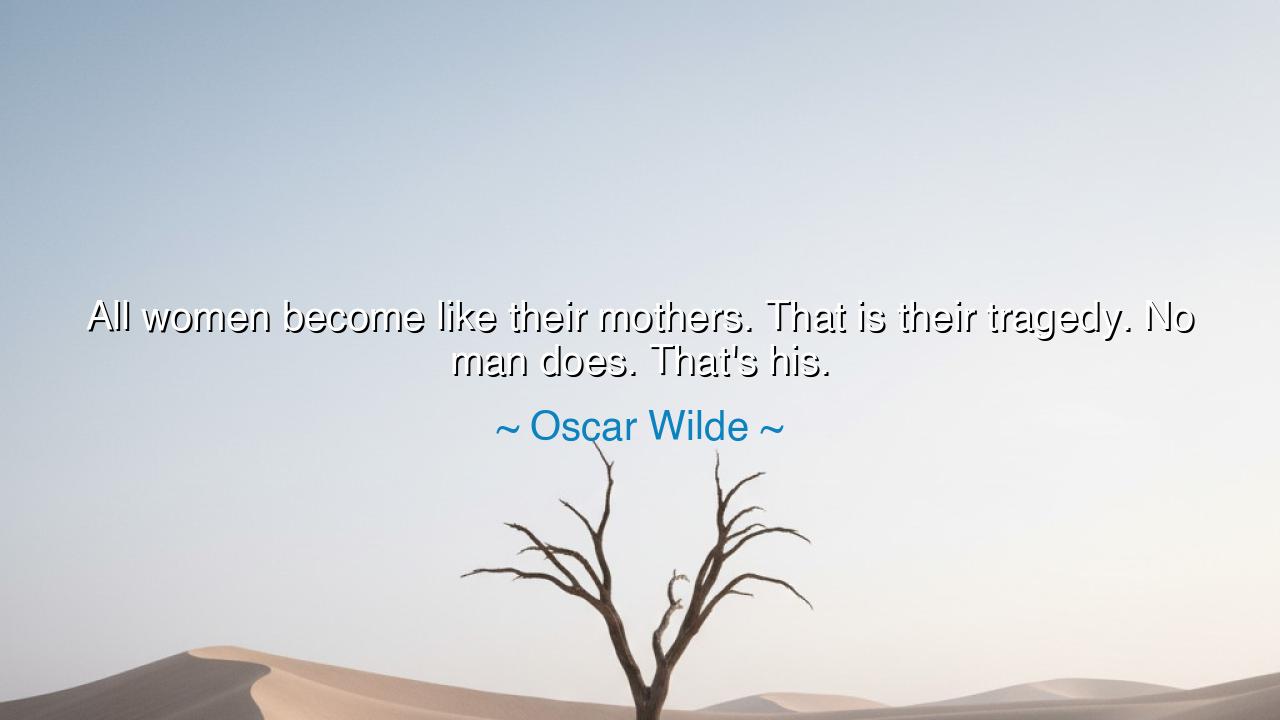
All women become like their mothers. That is their tragedy. No






Hear, O children of wisdom, the piercing words of Oscar Wilde: “All women become like their mothers. That is their tragedy. No man does. That's his.” In this saying lies both jest and prophecy, for Wilde spoke often with irony, yet his laughter carried the weight of human truth. He unveils the fate of inheritance, the way we are shaped by those who gave us life, and the sorrows that arise when resemblance becomes either too strong or too absent.
For the woman, Wilde calls it tragedy that she becomes like her mother. This is no scorn of motherhood, but a reflection on the sorrow of repetition—of lives bound by expectation, tradition, and duty. In Wilde’s age, women often inherited not freedom but constraint, passing from one generation to the next the same silences, the same restrictions. Thus, to “become like their mothers” was to risk losing individuality, to be trapped in cycles not of one’s choosing.
For the man, his tragedy is the opposite—that he does not become like his father. This absence marks a different wound: the hunger for guidance, the longing to live up to an image, and the grief of falling short. The son seeks to inherit the father’s strength, wisdom, or stature, but often finds the shadow too great or too faint. Here Wilde unveils the paradox: women suffer from being shaped too closely, men from being shaped too little.
History shows us examples of this dual truth. Consider Alexander the Great, who lived in the looming shadow of Philip of Macedon. His triumphs were his own, yet always measured against his father’s name. Contrast this with the countless unnamed daughters of history, whose lives were replicas of their mothers, their identities lost in the unbroken chain of domestic expectation. Thus Wilde’s paradox unfolds: in one case, the pain of resemblance; in the other, the pain of divergence.
Therefore, O seekers of wisdom, hear this teaching: every soul wrestles with the inheritance of blood. Some are bound by too much likeness, others by too little. The challenge of life is to honor those who came before while also shaping one’s own path. For if tragedy lies in becoming or not becoming like our parents, then greatness lies in transforming that inheritance into something new, something wholly one’s own.






NYNhu Y
Wilde's quote is thought-provoking but also problematic. It presents the idea that women are destined to follow in their mothers’ footsteps, which can seem limiting or even oppressive. Meanwhile, the suggestion that men avoid this fate feels like an oversimplification. Don't men also experience their own set of pressures and legacies? It makes me wonder if Wilde is commenting on gender roles more broadly—how both men and women are shaped by their upbringing, but in different ways.
PNLe Tran Phuc Nguyen.
Oscar Wilde’s statement feels like a commentary on gender expectations and the roles society forces people into. He seems to suggest that women are bound to become like their mothers, almost as if it’s their fate or tragedy, while men are free from this. Is this really true, though? Don't men also often face expectations based on paternal figures? Perhaps Wilde is using this quote to critique how both genders struggle with the legacies of their parents, though in different ways.
HBHan Bao
I think Wilde's quote taps into a deeper societal truth—how much we inherit from our parents, both biologically and in terms of behavior. His statement about women becoming like their mothers feels a little harsh, but also poignant, given the pressure on women to follow in maternal footsteps. But does the same apply to men? Can’t they also inherit or adopt traits from their fathers, even if it's not as openly acknowledged?
八H八犬 Hakken
Wilde's quote seems to underscore the tension between individuality and familial expectations. The notion that all women become like their mothers sounds almost like a burden, while men are, supposedly, free from this fate. But does this reflect reality? Women often face intense pressure to adhere to maternal roles, but can’t men also be heavily influenced by their fathers or their upbringing? Maybe Wilde is highlighting the complexity of how we shape our identities, regardless of gender.
BGAFK Mvp ban ga
Oscar Wilde's quote is certainly provocative. The idea that women inevitably become like their mothers suggests a kind of inescapable cycle, while the implication that men don’t undergo the same fate feels like a critique of gender expectations. Is this Wilde's way of commenting on societal pressures for women to conform to traditional roles? What does it mean for both men and women in terms of identity formation—are we truly so shaped by our parents?